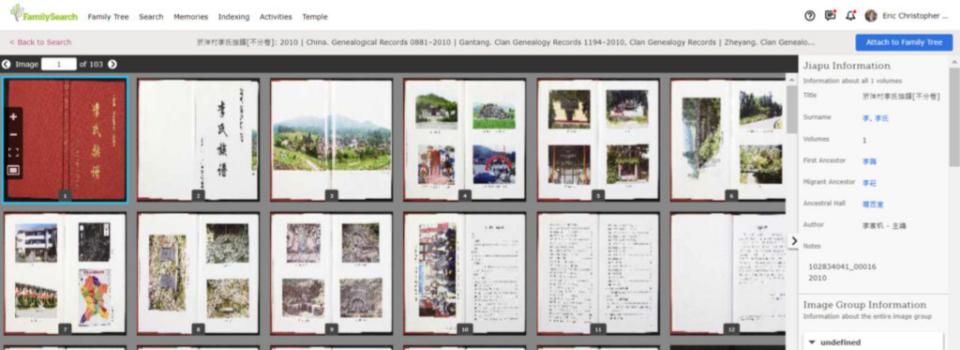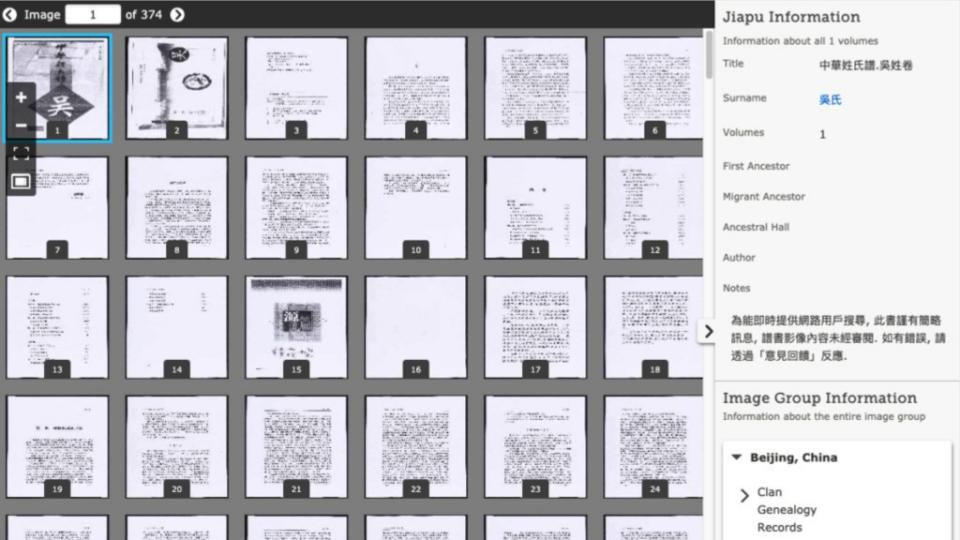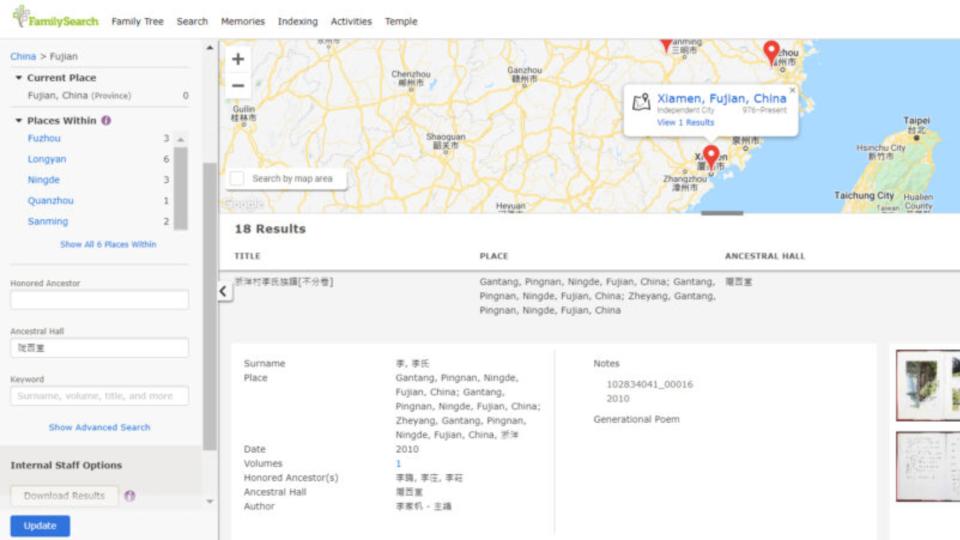
Jiapu
A screenshot of a jiapu on FamilySearch.org. Photo by Eric Leach, courtesy of Church News.All rights reserved.This story appears here courtesy of TheChurchNews.com. It is not for use by other media.
By Sydney Walker, Church News
With a limited four-generation family tree, Pei-pei Chang knew she had relatives in mainland China with a deep jiapu — family record books — that could help her trace back her ancestry. But her father had died and she had no contact information for her relatives.
For years, Chang tried searching for her ancestors’ jiapu in FamilySearch. Then recently, she discovered a new feature that allowed her to search by surname and location.
Chang searched for her ancestral characters and traced the lines to her father, grandfather and great-grandfather’s names. She went through many record books, page by page. Two days later, she stumbled upon her jiapu.
“The joy in my heart was indescribable,” recalled Chang, who lives in Taiwan and relayed her experience to FamilySearch. “This really has been a priceless gift.”
Chang said she plans to use her jiapu to complete her ancestors’ information so she can complete their temple ordinances.
Eric Leach, Chinese experience manager for FamilySearch, described jiapu as the “gold mine” for Chinese genealogical research. FamilySearch has the world’s largest online collection of jiapu and is working to make it more accessible, he said.
“Many people today are looking for their jiapu and really don’t know where to find it. But when they find it, they aren’t finding one person or one record,” Leach said. “They’re finding the jackpot — thousands of names — and not just names, but stories.”
What Is a Jiapu?
A jiapu is a multigenerational family record maintained by a Chinese clan that dates back thousands of years. “The idea with a Chinese surname is that everyone who has that surname descended from a common ancestor,” Leach said.
A jiapu may contain tens of thousands of names and span many volumes. It typically begins with a description of the first ancestor — who he was, where he lived, what he did — and continues with his children, grandchildren, great-grandchildren and so on.
This record may also include teachings, values and ideals the family has passed down.

Jiapu
A screenshot of a jiapu on FamilySearch.org. Screenshot from FamilySearch.org, courtesy of Church News.All rights reserved.In western culture, the concept of a family tree usually starts at the bottom and branches out from two parents to four grandparents to eight great-grandparents and so on. “It’s a story of many families, many different surnames of people who came together to make me who I am,” Leach said.
The Chinese concept of family, however, starts at the top with a common ancestor and branches out with one surname. While a Smith in the United States is not related to every other Smith, a Chang in China is of the same clan as other Changs.
Mitch Wasden, FamilySearch Asia/Pacific product marketing manager, said even for those who don’t have Chinese ancestry, the rich family documentation found within a jiapu can be inspiring.
“This is the love that the Chinese people have for their family — how can we infuse that into our culture and really learn from our ancestors so that we can pass down the wonderful things that have happened?”
Searching for Jiapu
FamilySearch has been collecting jiapu images in mainland China since 1978 and has more than 65,000 jiapu — a number Leach said they hope to double in the next five years.
Partnering with the Shanghai Library, the National Library of China and other libraries in China, FamilySearch is acquiring more jiapu to help those with Chinese ancestry piece together their family history.
A recent update to the jiapu search on FamilySearch allows a user to search by surname and location, with simplified characters or traditional characters. The jiapu search works only if a user’s language is set to Chinese or if they are searching for a place in China.
“This is the first of many improvements that are coming,” Leach said. “We are doing a project to make Chinese records more searchable and more accessible and to make the overall experience on FamilySearch better. This is just the beginning.”

Jiapu
A screenshot of a jiapu search on FamilySearch.org by ancestral hall in Fujian, China. Photo by Eric Leach, courtesy of Church News.All rights reserved.Later this year, users will also be able to search by generation poem — a unique sequence of generational words that can help determine how closely a branch is related.
To begin searching for a Chinese jiapu, visit the Explore Historical Images page and enter “China” into the place field. For step-by-step instructions for using the jiapu search, click here.
Those with Chinese ancestry who don’t read Chinese can find help in the Chinese Genealogy Research group in the FamilySearch Community. Book an online consultation with a Chinese research expert here.
Copyright 2021 Deseret News Publishing Company